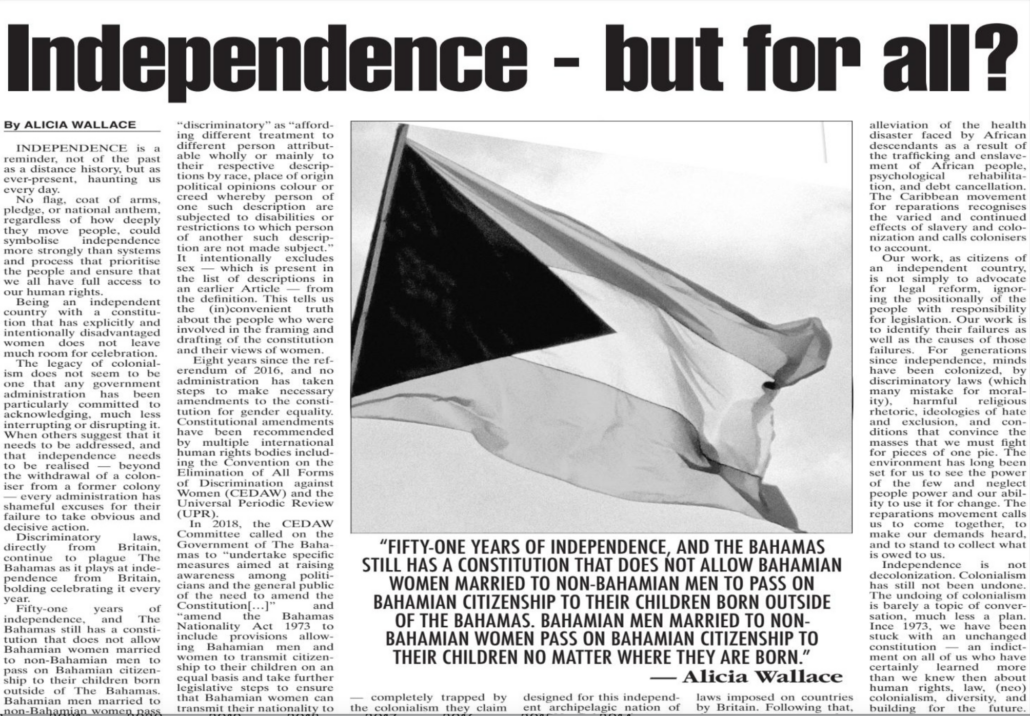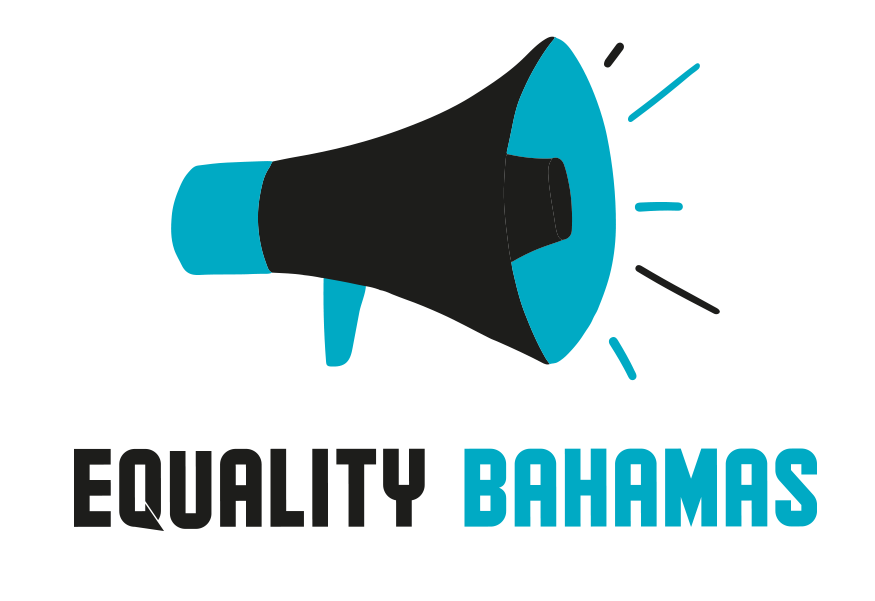Independence – but for all? (The Tribune)
July 9, 2024– The Tribune
Equality Bahamas founder and co-director Alicia Wallace featured in The Tribune on July 9, 2024.
Alicia penned an article for The Tribune’s special Independence Day supplement.
Read it in full below.
Independence is a reminder, not of the past as a distance history, but as ever-present, haunting us every day. No flag, coat of arms, pledge, or national anthem, regard
less of how deeply they move people, could symbolize independence more strongly than systems and process that prioritize the people and ensure that we all have full access to our human rights. Being an independent country with a constitution that has explicitly and intentionally disadvantaged women does not leave much room for celebration.

The legacy of colonialism does not seem to be one that any government administration has been particularly committed to acknowledging, much less interrupting or disrupting it. When others suggest that it needs to be addressed, and that independence needs to be realized—beyond the withdrawal of a colonizer from a former colony—every administration has shameful excuses for their failure to take obvious and decisive action.
Discriminatory laws, directly from Britain, continue to plague The Bahamas as it plays at independence from Britain, bolding celebrating it every year. These laws, both constitutional and legislative,
Fifty-one years of independence, and The Bahamas still has a constitution that does not allow Bahamian women married to non-Bahamian men to pass on Bahamians citizenship to their children born outside of The Bahamas. Bahamian men married to non-Bahamian women pass on Bahamian citizenship to their children no matter where they are born. In May 2023, the Privy Council ruled that Bahamian men can pass on Bahamian citizenship to their children born out of wedlock. Ahead of that ruling, the Government of The Bahamas claimed that it would address the issues of gender inequality in nationality rights that affect Bahamian women when the Privy Council ruling came in, suggesting that it would make the necessary amendments at the same time. It has yet to address any of these issues—not through constitutional amendments and not through legislative amendments.
The Constitution of the Commonwealth of The Bahamas defines “discriminatory” as “affording different treatment to different person attributable wholly or mainly to their respective descriptions by race, place of origin political opinions colour or creed whereby person of one such description are subjected to disabilities or restrictions to which person of another such description are not made subject.” It intentionally excludes sex—which is present in the list of descriptions in an earlier Article—from the definition. This tells us the (in)convenient truth about the people who were involved in the framing and drafting of the constitution and their views of women.
Eight years since the referendum of 2016, and no administration has taken steps to make necessary amendments to the constitution for gender equality. Constitutional amendments have been recommended by multiple international human rights bodies including the Convention on the Elimination of All Forms of Discrimination against Women (CEDAW) and the Universal Periodic Review (UPR).
In 2018, the CEDAW Committee called on the Government of The Bahamas to “undertake specific measures aimed at raising awareness among politicians and the general public of the need to amend the Constitution[…]” and “amend the Bahamas Nationality Act 1973 to include provisions allowing Bahamian men and women to transmit citizenship to their children on an equal basis and take further legislative steps to ensure that Bahamian women can transmit their nationality to non-Bahamian spouses.”
Importantly, the CEDAW Committee made the specific recommendation for the Government of The Bahamas to “set a clear time frame for a constitutional reform, supported by a comprehensive educational and awareness-raising campaign and the inclusive participation of civil society organizations, to expand constitutional protection from discrimination[…] to include at least the grounds of sex and gender.”
The people at the forefront of independence celebrations—the politicians—are mired in colonialism. In fact, that boggy ground has become a comfort zone. It means both that they cannot move and that they do not actually want to move. Being stuck—completely trapped by the colonialism they claim is over—then, is a convenience. It is an excuse. It is our problem and their solution. It is the ticket to nowhere, and it is too bad that our fates are bound to their action and inaction.
Independence is not enough. Colonizers have not done enough by simply dropping former colonies and creating “Commonwealths” and other institutions and nicely named relationships. There is a price that must be paid. We continue to suffer the consequences of colonization which did not end with independence. Colonization continued and continues to exist in our discriminatory, violent, anti-women, anti-LGBTQI+, anti-human rights laws. Colonization continued and continues to exist in the Westminster system that is certainly not designed for this independent archipelagic nation of 400,000. Colonization continued and continues to exist in the power hoarding by the privileged and corrupt few and their self-interest. Colonization continued and continues to exist in the warped thinking of people who have been taught, implicitly and explicitly, that some people just do not deserve life and liberty, and they have seen this teaching in practice by people in positions of power from government and religious institution to family and social groups.
Britain needs to pay reparations to The Bahamas and to every country it colonized. In 2018, then Prime Minister of the United Kingdom Theresa May made a statement of regret—not an apology—regarding the historical legacy of anti-LGBTQI+ laws imposed on countries by Britain. Following that, there was a program that included technical assistance for Commonwealth countries interested in working on legal reform to remove discrimination against women and LGBTQI+ people. This is the work that Britain must continue to be called to do and to fund.
Reparations is a critical conversation that needs to happen at various levels. The Bahamas National Reparations Committee has been a part of the regional call for reparations. The CARICOM Ten Point Plan for Reparatory Justice is clearly written and available on the CARICOM website, easily found by a search for the title. It begins with the call for a full formal apology and include investment in cultural institutions in the Caribbean, alleviation of the health disaster faced by African descendants as a result of the trafficking and enslavement of African people, psychological rehabilitation, and debt cancellation. The Caribbean movement for reparations recognizes the varied and continued effects of slavery and colonization and calls colonizers to account.
Our work, as citizens of an independent country, is not simply to advocate for legal reform, ignoring the positionally of the people with responsibility for legislation. Our work is to identify their failures as well as the causes of those failures. For generations since independence, minds have been colonized, by discriminatory laws (which many mistake for morality), harmful religious rhetoric, ideologies of hate and exclusion, and conditions that convince the masses that we must fight for pieces of one pie. The environment has long been set for us to see the power of the few and neglect people power and our ability to use it for change. The reparations movement calls us to come together, to make our demands heard, and to stand to collect what is owed to us.
Independence is not decolonization. Colonialism has still not been undone. The undoing of colonialism is barely a topic of conversation, much less a plan. Ince 1973, we have been stuck with an unchanged constitution—an indictment on all of us who have certainly learned more than we knew then about human rights, law, (neo)colonialism, diversity, and building for the future. Colonization did not just leave us with discriminatory laws. It left us with people who are determined to maintain that discrimination, having the expectation that they have something to gain from keeping others underfoot. People continue to seek to dominate other people as a demonstration of their own power rather than joining with others who have been harmed to build power together and use it to create change. The competition we constantly find ourselves in is a result of colonization, in combination with the neoliberal ideals exported to us daily. This is what keeps us away from the true experience of independence. Fireworks in the night sky as July 9 turns into July 10 is not it. There is more for us, and it requires more of us.
